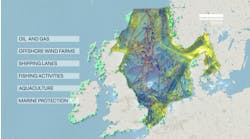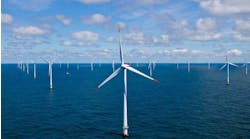Offshore staff
LONDON– Britain’s Department of Energy and Climate Change’s (DECC) is conducting an independently led review of oil and gas operations on the UK continental shelf.
Sir Ian Wood, the recently-retired chairman of oilfield services contractor Wood Group, leads the process. He will work with others in the industry, the UK government, and elsewhere to draw up recommendations to improve future economic recovery ofUKCS oil and gas.
UK offshore fields have so far produced 41 Bboe, and the government believes a further 20 Bboe could be delivered.
James Edens, vice president and managing director of CNR International (U.K.), and co-chair of industry association Oil & Gas UK, said: “While investment in developing the UK’s oil and gas is currently very healthy at record levels, it is important that we address the challenges of sustaining activity to maximize recovery over the long term.
“The valuable government-industry forum, PILOT, is currently considering issues such as access to infrastructure, exploration, incremental oil recovery and production efficiency, and the review…will be important in identifying how the efficiency and effectiveness of those efforts can be enhanced.”
Britain’s oil and gas chain also needs sustained investment, said Gordon Ballard, chairman and country manager at Schlumberger UK and Oil & Gas UK’s contractor co-chair.
One focus for DECC is to encourage new approaches to address the UK’s declining exploration and production rates, aging offshore facilities and declining production efficiency, and the risk of premature decommissioning of key infrastructure.
Other priorities include improved collaboration across the industry, and maximized use of enhanced oil recovery techniques on UK fields. To this end, the review will examine the current structure, scale, and effectiveness of the UK government’s stewardship regime in line with the increased technical and commercial complexity of the mature market. The recommendations could influence HM Treasury’s future tax policies.
Initial conclusions from the review are expected to be published this fall, with the final report and recommendations issued in early 2014.
Oil & Gas UK also has welcomed the EU Council of Ministers’ vote to approve theEU Directive on offshore safety. The new regulatory framework targets a reduction of major accidents related to offshore oil and gas operations, or if they do arise, to limit any consequences.
It sets out minimum conditions for safe offshore exploration and development, and is intended to improve response mechanisms in the event of a major incident.
The new law will apply to existing and future installations and operations. Only operators appointed by licensees or licensing authorities will be able to operate European offshore oil and gas operations.
The directive includes provisions designed to maintain the independence and objectivity of the competent authority. To prevent conflicts of interest, member states must ensure a clear separation between regulatory functions related to offshore safety and the environment and regulatory functions related to economic development, including licensing and revenues management.
Additionally, there are rules for transparency and information sharing, cooperation between member states, emergency response plans, and trans-boundary emergency preparedness and response.
Within three years of completion of transitional periods, the European Commission will submit a report to the European Parliament and the council to assess implementation of this directive. Member states with offshore waters will have two years to transpose the directive into national legislation.
6/11/2013


